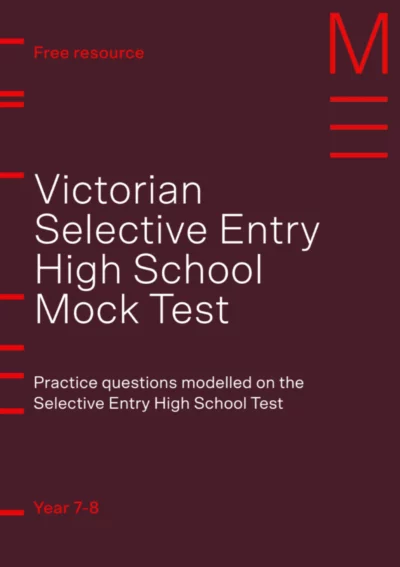Welcome to Matrix Education
To ensure we are showing you the most relevant content, please select your location below.
Select a year to see courses
Learn online or on-campus during the term or school holidays
Learn online or on-campus during the term or school holidays
Learn online or on-campus during the term or school holidays
Learn online or on-campus during the term or school holidays
Learn online or on-campus during the term or school holidays
Learn online or on-campus during the term or school holidays
Learn online or on-campus during the term or school holidays
Learn online or on-campus during the term or school holidays
Learn online or on-campus during the term or school holidays
Learn online or on-campus during the term or school holidays
Select a year to see available courses
Science guides to help you get ahead
Science guides to help you get ahead

What’s in the selective school test? Can my child prepare for it? In this article, we will explain how the test is arranged, consider some types of questions, and provide you with practical study tips for your child.
The Selective School test is the standardised test that all NSW Selective School applicants sit. It is designed to challenge even the most gifted of students to ensure they have the skills and knowledge to flourish at a Selective School.
Not sure if your child is ready for the Selective Test?
Book a free mock test to find out.
You'll get a personalised readiness report highlighting their strengths, gaps, and what to focus on next.
There are four components to the Selective School Test:
You may be a bit unfamiliar with Thinking skills as it’s not a subject taught at school. Don’t worry! We have provided an explanation of what the different sections consist of and how to best prepare for it.
The Reading test contains 30 questions which are to be completed within 40 minutes. A question might look something like this:
Correct Answer: C
The Reading section can be quite challenging for most students. Comparably, the questions and texts found in the Selective Test is almost on par with the Year 9 NAPLAN Reading test in terms of difficulty.
Preparation Tip: The easiest way to increase your literacy skills and understanding is to read!
Check out our list of recommended books for Years 7-8, which will be beneficial for Year 5 students preparing for the Selective School Test.
The Mathematical reasoning test contains 35 questions which are to be completed within 40 minutes. A question might look something like this:
Correct Answer: A
Calculators are not allowed in the Maths test and each question must be completed in just over a minute. Therefore, it is important that students are confident and quick at Mental Maths.
Preparation Tip: You could try giving them 10 Mental Maths questions a day in the lead-up to the test to help them improve.
The Thinking skills test contains 40 questions which are to be completed within 40 minutes. The Thinking skills test replaces the GA test that was used in the past, and it seeks to test the student’s critical thinking and logical reasoning.
Here is what a Thinking skills question may look like:
Among the items at the boutique shop were several pieces of designer clothing, none of which cost over $500. All the items made from leather at the boutique shop were pieces of designer clothing.
Based on the above information, which one of the following must be true?
A. This item was bought from the boutique shop for $1000. It must not be made from leather.
B. The only items at the boutique shop which did not cost over $500 were pieces of designer clothing.
C. This piece of designer clothing was bought from the boutique shop. It must be made from leather.
D. If an item bought from the boutique shop is not made from leather, then it is not a piece of designer clothing.
Correct Answer: A
The Thinking skills test may also require students to identify the meaning of words with or without their context.
Preparation Tip: Practice lots of questions under timed conditions because the Thinking skills test is arguably the most time pressured section.
The Writing Test is usually an imaginative/creative response to a stimulus which must be completed within 30 minutes. Students should write no more than 2 pages. Students are awarded high marks if the writing has:
Here is what a question may look like:
Use the following idea as the basis for a piece of writing:
If you had just one wish to make the world a better place, what would you wish for?
Scoring a high mark in this section can be quite hard. The most important thing you can do is encourage your child to read and write.
Preparation Tip: Create a blog with your child or buy a journal for them to encourage writing.
It is essential that if you want your child to succeed, they should get familiar with the structure of the exam. There is a sample test available in the new format here. Keep in mind that the past Selective School tests (prior to 2021) are in a different format.
Some things that can be helpful include choosing a central study space or putting in a standing desk if you child likes to pace when learning. You can read more here.
The stress of getting into a Selective School can be huge especially for a Year 5 or Year 6 student. Get them to do at least 60 minutes of daily physical activity which will release endorphins, promote mental clarity and improve your child’s mood.
Give your child the competitive edge with this test and help them succeed in the real thing! Fill out your details below to get this resource emailed to you. "*" indicates required fields
Get your FREE full Selective Entry High School Mock test

Get your FREE full Selective Entry High School Mock test
Students should not bring pens, pencils, rulers, paper and books. All writing materials will be provided at the centre. Watches, calculators, phones and any other devices that compute, photograph, communicate or make noise are not permitted near the student’s desk at the test centre.
| Activity | Start | Finish |
| Parents drop off students | 8:30am | 9:00am |
| Administration | TBA | TBA |
| Reading Test (40 Minutes) | TBA | TBA |
| Break (5 Minutes) | TBA | TBA |
| Mathematical reasoning Test (40 Minutes) | TBA | TBA |
| Break (20 Minutes) | TBA | TBA |
| Thinking skills (40 Minutes) | TBA | TBA |
| Break (5 Minutes) | TBA | TBA |
| Writing Test (30 Minutes) | TBA | TBA |
Question Source: © State of New South Wales (Department of Education) 2019
Not sure if your child is ready for the Selective Test?
Book a free mock test to find out.
You'll get a personalised readiness report highlighting their strengths, gaps, and what to focus on next.
We’ll provide you with even more tips so you can maximise your child’s entry score!
© Matrix Education and www.matrix.edu.au, 2025. Unauthorised use and/or duplication of this material without express and written permission from this site’s author and/or owner is strictly prohibited. Excerpts and links may be used, provided that full and clear credit is given to Matrix Education and www.matrix.edu.au with appropriate and specific direction to the original content.